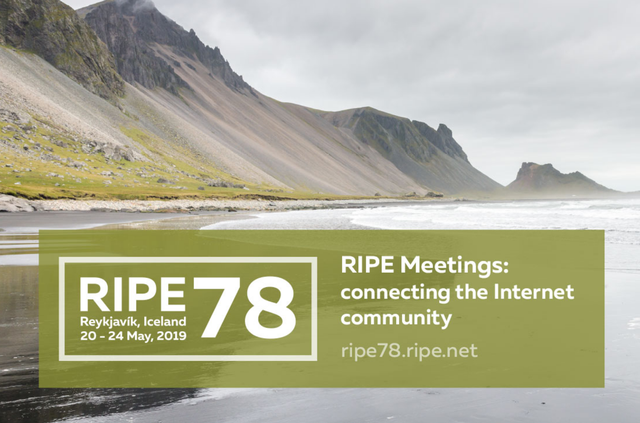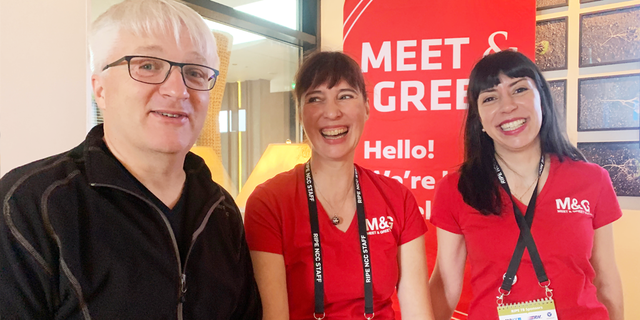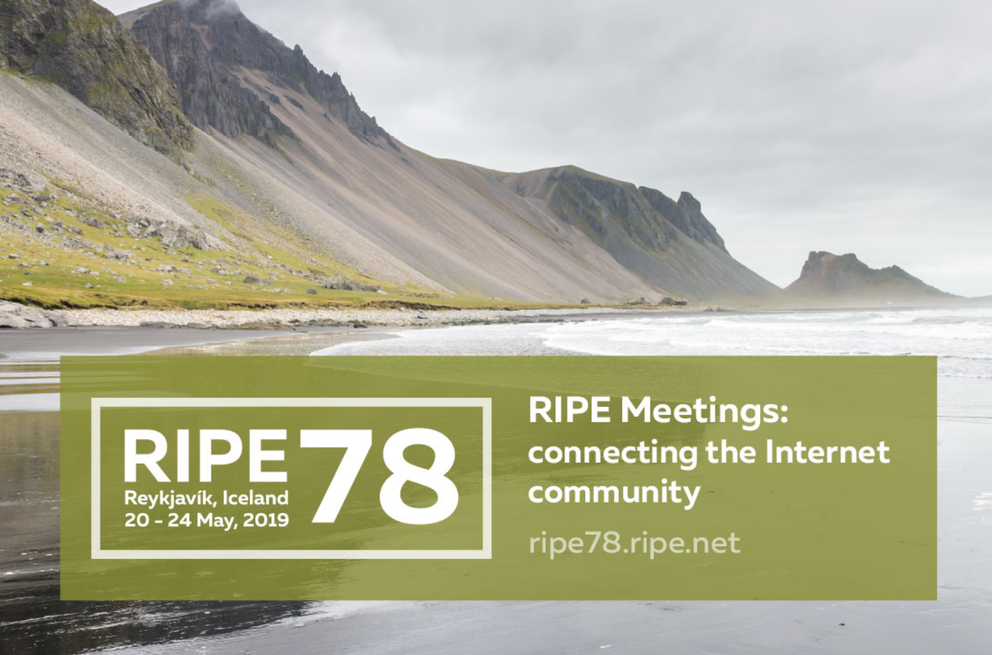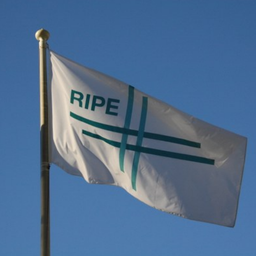The community met in Reykjavik for RIPE 78 over 20-24 May 2019. In keeping with the idea of better reporting, here are some of the key events and discussions from the meeting week. A lot goes on at a RIPE Meeting, so not everything is mentioned here. Topics are ordered roughly according to when they took place during the meeting, rather than by importance.
DAY 1
Opening Plenary
In the opening session of the meeting, I mentioned that the RIPE Diversity Task Force was working on an updated Code of Conduct, which was covered in a lightning talk later in the week. I also noted that the RIPE Accountability Task Force had published its final report ahead of RIPE 78. I have asked the RIPE NCC to make this into a RIPE Document and the next step will be to review the task force’s recommendations to see where further action is needed.

RIPE 78 took place in beautiful Reykvavik, Iceland
RIPE Big Picture BoF
The first RIPE Meeting was on 22 May 1989, which meant that the community’s 30th birthday was during RIPE 78. Milestones like this often provide an opportunity to pause and to reflect, and it was, therefore, fitting that a well-attended RIPE Big Picture BoF looked at where we are heading as a community. This was a continuation of the RIPE Navel Gazing BoF at RIPE 77.
The minutes from the BoF are published, but to briefly summarise some of the key takeaways from the session:
Building Consensus
RIPE runs on consensus, and for the most part, we have taken the IETF’s definition for our own. While this has proven to be suited for technical matters, we are increasingly seeing policy proposals of a more political nature. In these cases, rough consensus or compromise positions seem to be much more difficult to reach. And while we tell ourselves that we do not vote for proposals, often our +1s function in a similar manner on the mailing lists. Perhaps it is worth revisiting what consensus means for us as a community and finding clarity on how to improve the PDP to address today's issues and those in the times to come. The Accountability Task Force described some of this in its report, which I encourage everyone to read.
Who is the Community?
We are much more than a handful of techies in a room these days – a good part of society runs on the technologies we deploy and maintain. As the stakes have risen, we have seen greater involvement from law enforcement and governments, as well as other people with an interest in the “social” aspects of the Internet. We should expect to be periodically confronted with questions about who we are as a community and what our primary concerns should be.
An excellent suggestion from the BoF was that we should include space in the RIPE Meeting plenary for community discussions. This would not only be a space that allows us to discuss these kinds of issues, but also to highlight some of our successes. As RIPE Chair, I am ultimately responsible for the agenda of RIPE Meetings and this is something that I will be discussing further with the RIPE PC and working group chairs, with the likely outcome that we will get a regular slot for these kinds of discussions at the next meeting.
What is the RIPE Database?
Much of this abstract naval-gazing quickly becomes more concrete when we consider the RIPE Database. While it is fundamental to the work of RIPE, now more questions are being raised about what kinds of data it should contain, what degree of accuracy is required, and what purposes it should be geared towards. These broad questions are not easily answered with a policy proposal. Participants at the BoF supported the creation of a task force that would develop a set of requirements, considering what the RIPE Database needs to do and what information is required. I am not expecting this work to take an overly long time, and I will be calling for volunteers to join the task force soon.
DAY 2
Selection Process and the NomCom
On the evening of the second day, there was a BoF that discussed the process for selecting RIPE Chairs. Ahead of RIPE 78, two draft documents were published:
At the BoF there was general agreement on the documents (minutes online). Following the BoF, I posted a reminder to the RIPE community mailing list, asking people to send any comments to ripe-chair-discuss@ripe.net. Following a "Last Call for comments", I plan to call consensus on this soon.

Helping out the Meet & Greet Team at RIPE 78
DAY 3
Setting the Deckchairs in Order
It seems that at every third meeting, someone declares that surely these will be the last changes to the RIPE community’s IPv4 policies. With the exhaustion of the RIPE NCC’s final remaining IPv4 pool fast approaching, it looks like we will be making changes right until the end. This is not a bad thing, as it shows that we continue to take our role as the responsible stewards of number resources seriously as a community. The two proposals discussed at RIPE 78:
- 2019-02, “IPv4 Waiting List Implementation” aims to reduce the IPv4 allocation size to a /24 once the RIPE NCC’s remaining pool is gone – which essentially means that more members will be able to receive a (smaller) allocation of returned address space via a future waiting list.
- 2019-05, “Revised IPv4 assignment policy for IXPs” would expand the pool of IPv4 that is reserved for IXP peering LANs and makes some changes to the assignment sizes. The aim is to ensure that IPv4 is preserved for IXPs, recognising the important role that they play in the Internet.
Due Diligence and Sponsoring LIRs
Noteworthy here were the presentations that touched on due diligence and the responsibilities of sponsoring LIRs. This was in the wake of two rather public cases where the RIPE NCC members were closed for submitting untruthful information on behalf of their End Users.
As RIPE Chair, it is not for me to wade into what is primarily a membership issue, though I would like to repeat a comment from one of the WG chairs at the session: while it is perfectly valid to discuss whether the current governance framework of the RIPE NCC is appropriate, the community doesn’t have a role in second-guessing the decisions of the independent arbiters, especially when it doesn’t have access to the same information they were provided.
DAY 4
ITU-T SG-20 IPv6 Work
In the IPv6 WG, the RIPE NCC gave a brief update on the work of Study Group 20 within the ITU (SG-20), which had earlier sought to develop an IPv6 addressing plan for IoT deployments. SG-20 recently decided to drop this work, largely due to well-timed interventions by the RIPE NCC, which called on the RIPE community to review the draft document and provide input. If the community’s take on the addressing plan could be summed up in one line, it would be that it was not based on operational experience.
This outcome is a great example of community cooperation and engagement, with the RIPE NCC offering excellent support as secretariat. I commend everyone in the IPv6 WG who took the time to review the document and provide feedback.
BGP Hijacking is a Policy Violation
The main event in the Anti-Abuse WG was the policy proposal 2019-03, “BGP Hijacking is a Policy Violation”. This has received a phenomenal number of comments on the mailing list and raises some fundamental questions about the degree to which the community should seek to enforce behaviour through its policies. I do want to remind people that you set the tone and culture of RIPE when you participate in these discussions. It’s great to see people engaging with the PDP, and it's understandable that discussions can become heated, but please try to keep it civil. There are people watching the RIPE community and drawing conclusions from both the style and content of our debates. We do a disservice to ourselves as a community when we don’t treat one another with respect.
Personal Data in the RIPE Database
After the last meeting, there was a discussion on whether person objects (containing personal data) are still needed in the RIPE Database, as it is now generally accepted that role objects can function just as well in terms of providing a valid contact. Following on from the BoF on Monday, I think the question of the need for personal data folds into the larger question of what the purpose of the RIPE Database should be. This will be something for the task force to look at when it develops its set of requirements.
WG Chairs and Timekeeping
At every RIPE Meeting, the WG chairs get together for a lunchtime meeting to discuss issues relating to WG groups, the meeting agenda, and the RIPE community more generally (summaries of these meetings are published online). A key point to mention from this meeting was that I stressed the importance of timekeeping. An often-overlooked part of RIPE Meetings is the opportunity to network with colleagues during the coffee breaks, and for many of us with responsibilities in consecutive sessions, we need time to go to the bathroom or grab something to eat. It is up to presenters to decide how much time they want to reserve for discussion – it is unfair to the person following them if their time is used up by someone else. This means that chairs must be willing to cut people off where necessary, and they should reserve time on their agenda to allow for community discussion where needed. When Rob was RIPE Chair, he would often summarily close a session that had run into the break, and I am not afraid to do the same!
Report from the Trusted Contacts
The RIPE Meeting Trusted Contacts regularly keep me up to date about the number of reports and complaints they receive at each meeting (in an anonymised fashion of course). For RIPE 78 we received:
- One complaint about unprofessional in-meeting behaviour
- One complaint about unprofessional mailing list behaviour
The team decided to switch off moderation of the mailing list, because that caused some misunderstanding about who is moderating the list (even though moderation has always been done by the trusted contacts themselves and not by any third party).
DAY 5
Closing Remarks
Every meeting ends with some closing remarks from the RIPE Chair and some statistics. At RIPE 78, we had 742 attendees, 199 (23%) of which were newcomers (you can find some more numbers in the slides).
But what I really want to mention here is the success of a number of different initiatives that, when taken together, really seem to be helping to keep RIPE an open, friendly and dynamic community:
- It was only two RIPE Meetings ago that we first piloted on-site childcare. While there wasn’t much uptake at RIPE 76, we were prepared to give it some time. But it seems that word has spread quickly – only two meetings later and we were fully-booked at RIPE 78, with 14 kids at the meeting (future members of the RIPE community?)
- The Women in Tech session moved into a bigger space and seems to be stimulating some interesting and eye-opening discussions among the community.
- The RIPE Meeting Mentoring Programme matched 20 experienced members of the community with 20 newcomers according to their interests (please consider volunteering as a mentor for RIPE 79).
- We trialled Slido as a way for people to ask questions for those who are unable or hesitant to speak at the microphones.
- And both the RACI and the RIPE Fellowship continue to bring new blood and fresh ideas into the community.

Childcare at RIPE 78
If you’ve made it with me this far, my final point I want to end with is that RIPE is above all a community. For 30 years, we have had all manner of discussions – some serious, others trivial. All of them were based on the recognition that the best way to solve problems is with a bottom-up, consensus-based approach. Today there are some big issues facing us as a community, and probably others are just over the horizon. If you have ideas about how things can change or want to contribute, put your hand up and get involved. WG Chairs are periodically stepping down and we are looking for fresh faces to give it a shot. There are regular PC elections, as well as task forces, BoFs and other groups. Or maybe just contribute to a policy discussion on the mailing lists or speak at the microphone. Because at the end of the day, RIPE is a community rather than a conference, which means it will only ever be as valuable or as effective as we make it.






Comments 0
The comments section is closed for articles published more than a year ago. If you'd like to inform us of any issues, please contact us.